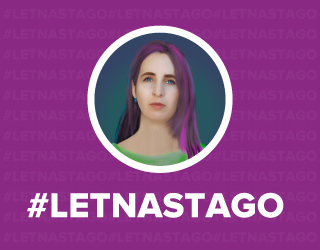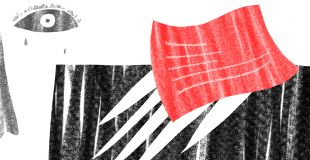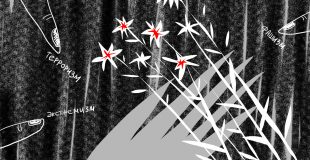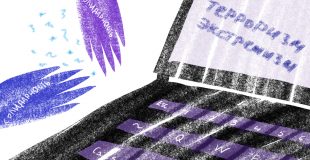
Human rights organization Human Constanta continues to collect information and analyze tendencies in the application of legislation on countering “extremism” in Belarus from the standpoint of international human rights standards, primarily from the point of view of the right to freedom of expression. In this review, we describe the events of two months – June and July 2021 (the review for April and May 2021 can be found here).
This period was marked by unprecedented pressure on the civil, human rights, and journalistic communities: the resources of many major media were blocked, while many journalists and activists were searched, including on suspicion of committing “acts of terrorism.” On July 14, 2021, more than 50 searches were carried out in the course of one day. Some civil society representatives were detained.
The courts set a “record” for the number of banned channels and chats in Telegram. The practice of persecution for any form of self-organization in society has expanded: now the transfer of any data from state officials is interpreted as “inciting hatred”, sending video recordings to opposition Telegram channels as “making extremist materials,” and preparing transfers for prisoners as “financing extremist activities.”
Punishment for expressing dissenting opinions has become more frequent and more severe. The number of cases for “inciting hatred” has increased both in relation to public figures and in relation to ordinary citizens for comments on social networks. The number of accusations of “acts of terrorism,” conspiracies and calls to harm national security has also increased.
Содержание
Criminal cases
General statistics

The Supreme Court of the Republic of Belarus and the Ministry of Internal Affairs of the Republic of Belarus (hereinafter – the Ministry of Internal Affairs) did not provide, upon our request, statistics of cases for the first half of 2021.
On July 26, 2021, Prosecutor General Andrei Shved said that over 4,200 criminal cases related to extremism and terrorism have been initiated in Belarus (of which 803 criminal cases have already been sent to courts against 1,116 people and 704 criminal cases against 955 persons have been heard). On July 30, 2021, the Investigative Committee stated that since August 2020 4,691 criminal cases were initiated related to “illegal mass events, riots, protests, encroachments on state sovereignty and public safety, deliberate destruction and damage to property, violence and threats against officials and members their families.”. Most of these crimes, following recent amendments to the Law on Countering Extremism, can now also qualify as crimes of extremism, since the amendments have significantly expanded the use of the term “extremism” as a ground for restricting freedom of opinion,as well as freedom of assembly and association.
Statistics for the first half of 2021 appeared on the website of the Supreme Court only on August 10, 2021, but there is no necessary information which we requested for (e.g. under Articles 130, 368 of the Criminal Code). According to separate judicial statistics on cases involving minors under Art. 293 of the Criminal Code 5 minors were convicted, and under Art. 342 and Art. 369 of the Criminal Code one minor was sentenced for each article.
As of August 7, 2021, 610 people in Belarus were recognized as political prisoners. Due to the fact that only those who are held in custody, under house arrest or in places of deprivation of liberty are recognized as political prisoners, the figure of 610 is only part of the official statistics. Human rights organizations do not have information on all cases, and in a number of cases involving an element of violence (damage to property, resistance to police officers, acts of terrorism), a conclusion about the political grounds of the persecution and disproportionate punishment can be made only after the trial.
According to information from the Human Rights Center Viasna (hereinafter – HRC Viasna), in June and July 2021, 16 people were convicted under Art. 293 of the Criminal Code (“riots”) and 25 people – under Art. 342 of the Criminal Code (“organization and preparation of actions that grossly violate public order, or active participation in them”).
The examples of the actions for which “extremist cases” are initiated are given below.
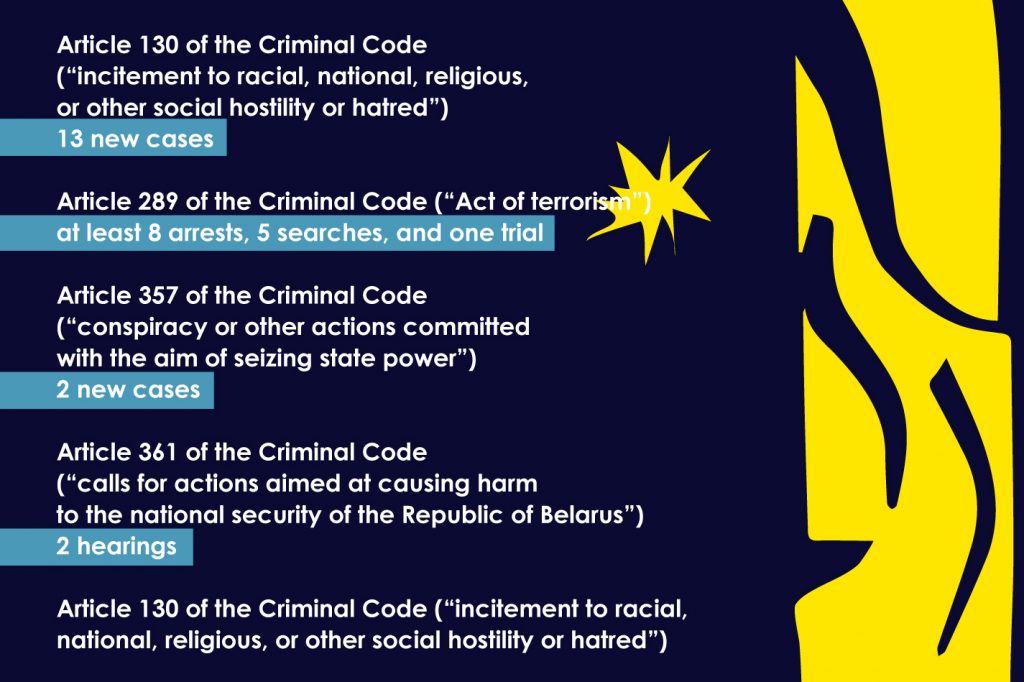
By the Law of May 26, 2021 No. 112-З “On Amendments to Codes on Criminal Liability,” the composition for “rehabilitation of Nazism” was removed from this article – now there is a separate Art. 130-1 of the Criminal Code of the Republic of Belarus (hereinafter – the Criminal Code) for this.
Some of the accused and suspects under Art. 130 of the Criminal Code were released from custody as a result ofthe Polish diplomatic and consular services’ efforts, activists of the Polish community Irena Bernatskaya, Maria Tishkovskaya, and Anna Panisheva, who were held in the case of the Union of Poles (accused under Part 3 of Art. 130 of the Criminal Code), were able to leave for Poland. Glubokoye journalist Dmitry Lupach, who was detained on July 8, 2021 under Art. 130, was released after 72 hours of detention.
In other cases, this article has become increasingly used to suppress freedom of opinion and punish citizens who speak out negatively against the current government. We are aware of 13 new criminal cases under this article.
The deanonymization of law enforcement officers has come to be regarded as inciting social hatred. An employee of the agency for state registration and land cadastre and a bank employee were detained for deanomyzation under Art. 130 of the Criminal Code. According to the Ministry of Internal Affairs, they transferred personal data of security officials to opposition Telegram channels. Moreover, we became aware of the detention of the operator of Lukoil-Belarus, charged with publishing information about the security forces in Telegram channels.
The detention of Telegram chats’ users, which have allegedly left harsh critical messages about the current state authorities and law enforcement officers, interpreted by the investigating authorities , has continued. We are aware of several almost identical criminal cases under this article against a 19-year-old resident of the Ivanovo district, a 43-year-old resident of Smorgon, a 27-year-old resident of Minsk. We are also aware of the case of a 30-year-old resident of the Vitebsk region who, according to the Main Directorate for Combating Organized Crime and Corruption (hereinafter – GUBOPiK), “at the direction of BY_POL representatives made an attempt to influence an employee of the internal affairs body at the place of residence”. An inspection on the facts of alleged incitement of social hatred is also being carried out in relation to a 37-year-old international driver from Grodno, who was detained for insulting Lukashenka and government officials. On July 27, 2021, it became known about the detention of a 47-year-old blogger from Kobrin under Art. 130 of the Criminal Code for criticizing state authorities in his videos.
On June 7, 2021, according to the HRC Viasna, Brest Regional Court announced the verdict to Vladislav Burin, a resident of Baranovichi, in a criminal case of incitement to hatred. The judge found him guilty under Part 1 of Art. 130 of the Criminal Code and sentenced him to 3 years in prison. According to the position of the prosecution, from September 20 to September 27, 2020, in the Telegram chat of the “Punisher” group, the man posted 13 messages in which, according to linguistic and psychological expertise, he “negatively assessed” the actions of law enforcement officers and “encouraged illegal criminal actions” in relation to police officers, military, civil servants, and members of their families.
By monitoring the schedule of court hearings, we became aware of three more cases under Art. 130 of the Criminal Code – two of them were held in the Vitebsk Regional Court. The Supreme Court of the Republic of Belarus appealed the case of a resident of Vitebsk, who was sentenced to 4 years 6 months in a maximum security colony for a video on TikTok in March 2021. There is a tendency of considering cases under this article in closed hearings.
Charges under Art. 130 of the Criminal Code also affect public persons. There is information about opening criminal cases for inciting social hatred (part 3 of Art. 130 of the Criminal Code) and insult to Alexander Lukashenko (part 2 of Art. 368 of the Criminal Code) against singer Anzhelika Agurbash, who repeatedly demonstrated her solidarity with the protesters. The singer said that state authorities had a warrant for her arrest. On June 14, 2021, the head of the Investigative Committee of the Republic of Belarus Dmitry Gora said that Sofia Sapega, detained during the infamous Ryanair incident, was officially charged with inciting social hostility and hatred.
According to the MAYDAY Telegram channel, GUBOPiK employees proposed the editor of Mogilev website 6TV.BY Dmitry Solovyov to disable the website. He had to leave Belarus, after a search and equipment seizure in his office. In case of a failure to close down the website, state authorities threatened the outlet’s staff with criminal prosecution under Art. 342 of the Criminal Code, as well as with liability “for inciting social hatred” for publishing video programs about the police.
Article 289 of the Criminal Code (“Act of terrorism”)
On July 2, 2021, Alexander Lukashenko mentioned “attempted terrorist attacks” and “hidden terrorist groups” in his speeches. On July 14, 2021, on the day of a massive crackdown on civil society, some of the searches were carried out as part of an unknown terrorism case. Suspicions of involvement in “acts of terrorism” are becoming a common ground for the detention of activists for a period of 3 to 10 days – we are aware of 8 arrests, 5 searches, and one hearing under this article.
On July 8, 2021, a politician and civil activist Vasily Polyakov was arrested. Vasily was able to tell his wife by phone that he was detained as a suspect under a criminal article related to terrorism (he was released on July 15, 2021). In the evening of the same day, within the framework of Art. 289 of the Criminal Code, the administrator of the Facebook-community “Letters of Solidarity” Sergei Borisov was detained. A former candidate for deputy from Borovlyany, Maria Voytovich, was also detained – she is suspected of “having links to a terrorist groupl” (she was released on July 16, 2021). On July 16, 2021, searches took place at the homes of human rights defenders from Rechitsa – Valery Putitsky and Andrei Medvedev. Volunteer Ilya Mironov, activist Andrei Pristavko, blogger Anastasia Pilyugina and her boyfriend Vladislav Pirton were also detained (after being questioned as witnesses for an “act of terrorism” they were arrested for 15 days for “insubordination”).
The searches under this article also affected media representatives. Under the article “act of terrorism,” employees of the State Security Committee (hereinafter – KGB) conducted searches in the office of Media-Polesye, as well as in the house of the editor-in-chief of this media outlet and the houses of some of its employees. On July 9, 2021, within the framework of the terrorism case, they came with a search to Brest journalists Maxim Khlebets and the editor of the First Region from Brest Oleg Suprunyuk, and on July 28, 2021, the same article was used as a ground for searching the apartment of the chief editor of the Mogilev media outlet 6TV.by Boris Vyrvich.
On July 13, 2021 Rechitsa businessman Denis Shilenko was searched under Art. 289 of the Criminal Code.
Most of the aforementioned people are already released. Andrei Medvedev said that the KGB named two conditions for release – recording a “confession video” and signing papers on cooperation with the KGB.
After his release, journalist Oleg Gruzdilovich said that other people detained were suspected of committing “terrorist attack in Vileika” – these people were a doctor, who played paintball, and a graduate student of the Belarusian National Technical University. According to the journalist, these people are already released. Moreover, many detainees note the interest of law enforcement officers in the chats of the “OGSB” (civil self-defense units of Belarus) and “Busly lyatsyats” (translator’s note: “Busly lyatsyats” means “Storks fly” in Belarusian), which they mention in the context of “anti-terrorist operations.” There is information that during the searches, the employees tried to find “a connection with terrorism and the OGSB” among the residents of the Zavodskoy district of Minsk, and on July 30, 2021, a search was carried out at Maksim Artyukhevych, who a member of the aforementioned chat.
According to the HRC Viasna, since July 8, 2021, a criminal case under Part 1 of Art. 289 of the Criminal Code against the 26-year-old resident of Minsk Yegor Mikhailov was being heard in Frunzensky district court. He is accused of setting a T-72 tank on fire at the railway station in Stepyanka by throwing a Molotov cocktail with the inscription “OGSB” at it on the night of January 31, 2021. On July 26, 2021 the court found Yegor guilty and sentenced him to ten years in a maximum security prison, ordering him to pay legal costs in the amount of 685 Belarusian rubles (about $ 273). It is important to note that in the winter, state media outlets called the news of the arson of the tank a fake.
Article 357 of the Criminal Code (“conspiracy or other actions committed with the aim of seizing state power”)
This article began to be used to prosecute independent experts – we are aware of at least two such cases:
On June 28, 2021, Tatyana Kuzina, a co-founder of the school of young managers of public administration Sympa and an independent expert in the field of public administration, was detained at the airport. On July 14, 2021, the expert’s colleagues posted on Facebook a photo of the court schedule of the Minsk City Court, according to which Tatyana was charged with violating three articles of the Criminal Code: Part 6 of Art. 16 of the Criminal Code (“complicity in a crime”); Part. 1 of Art. 357 of the Criminal Code (“conspiracy or other actions committed with the aim of seizing or retaining state power by unconstitutional means”); Part 3 of Art. 361 of the Criminal Code (“call for the seizure of state power”). On June 30, 2021, political observer Valeria Kostyugova was detained. She is charged under Art. 357 of the Criminal Code.
Article 361 of the Criminal Code (“calls for actions aimed at causing harm to the national security of the Republic of Belarus”)
In addition to the charge against Tatyana Kuzina under this article, 2 trials began in the summer of 2021 with a similar charge.
According to the Investigative Committee, the investigation of the criminal case against the administrator of the Telegram channel “White Robes,” who was detained in November 2020, has been completed. The actions of a 21-year-old student are qualified under Part 3 of Art. 361 of the Criminal Code (“distribution of materials containing calls for actions aimed at causing harm to the national security of the Republic of Belarus, using the global computer network Internet”). Since July 15, 2021, a hearing on this case has been held at the Minsk City Court. According to the case file, the Telegram channel recorded repeated calls for the mass dismissal of medical workers, poor-quality medical care and participation in protests and strikes. In addition, there were publications about the support of illegal mass events by medical workers, ways of countering the current government.
Grodno Regional Court began consideration of the case under Part 3 of Art. 361 of the Criminal Code against a 29-year-old resident of Grodno. The man is accused of publicly calling for violence and committing acts of terrorism, allegedly posted by him in one of the Telegram chats in October-November 2020. At the trial, the accused stated that he participated in the discussions and expressed his civil position, spoke emotionally against the security forces, and did not write the most radical of the above comments (“take picks, crush them with MAZs, BelAZs”).

For the first time the Criminal Code rules on financing an extremist formation were applied – under Art. 361-2 of the Criminal Code, the prosecution brought charges against volunteers of the “Country for Life” Foundation Marina Dubrovskaya, Anton Stashevsky, Yulia Syrykh, and Tatiana Ostrovskaya. The ground for their persecution was them putting together food parcels for the detainees. The criminalization of such volunteering clearly violates the right to freedom of association.
Administrative offenses
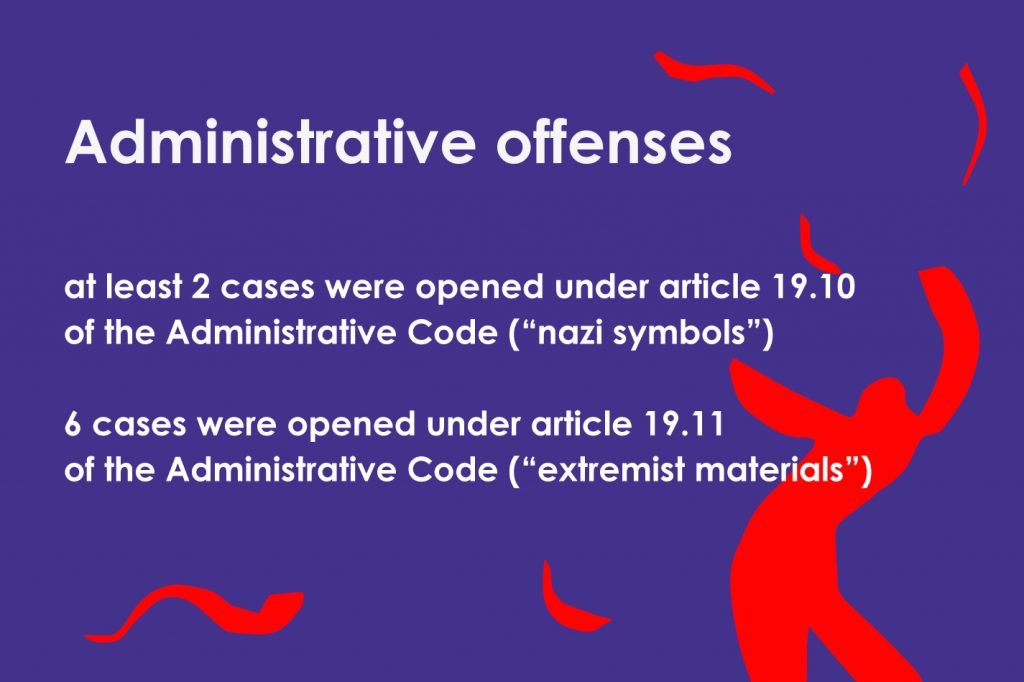
The most widely applied “extremist articles” under the Code of Administrative Offenses (hereinafter – the Administrative Code) include articles on the use of nazi symbols (Art. 19.10) and extremist materials (Art. 19.11). People are tried under these articles almost mechanically” – without assessing the context of their actions, the message sent, the probability of consequences, and other important criteria provided for by international human rights standards of limitingthe right to freedom of expression (for example, the Rabat Action Plan on the prohibition of propaganda of national, racial and religious hatred, which constitutes incitement of discrimination, hostility, and violence). Every year, the courts consider about 200 such cases, while only a few cases are made public. Below are the cases known for June and July 2021 – at least 2 cases under Art. 19.10 of the Administrative Code and 6 cases under Art. 19.11 of the Administrative Code.
Article 19.10 of the Administrative Code (“propaganda or public demonstration, production, distribution of nazi symbols or paraphernalia”)
On June 9, 2021, a message was published in the Telegram channel “GUBOP,” which stated that the employees of GUBOPiK in the Gomel and Minsk regions were identified and detained men who “spread information about their adherence to nazi ideas on social networks and publicly demonstrated nazi symbols.” According to the channel, the men were brought to justice, but it is not reported to which one.
On July 14, 2021, information about the detention of a 46-year-old Brest resident has surfaced. The man in question, according to the Ministry of Internal Affairs, in August 2020 “ called upon protesters to join an ultra-right nationalist organization and participate in unauthorized mass events.” In addition to other charges, protocols were drawn up against a Brest resident for propaganda and public dissemination of nazi symbols (Art. 19.10 of the Administrative Code). According to the press secretary of the Ministry of Internal Affairs, an inspection is also being carried out against a suspect regarding possible incitement or hatred (Art. 130 of the Criminal Code).
A man was detained in Kaplyntsy on charges of desecration of structures and damage to property – he is charged with drawing swastika and protest slogans on infrastructure facilities allegedly “under the influence of Telegram channels.” The exact legal qualification of his actions is not known.
Article 19.11 of the Administrative Code (“distribution, production, storage, transportation of information products containing calls for extremist activities or promoting such activities”)
On June 2, 2021, it became known that the employees of the Brest regional administration of GUBOPiK detained 12 people for violations of various “political articles.” Protocols were drawn up for 8 of them for participating in protests, distributing extremist products, and disobeying the police. We do not know the exact number of those charged under Art. 19.11 of the Administrative Code.
On June 24, 2021, a man from Minsk was sentenced to 14 days of arrest for distributing extremist materials. On July 13 and 23, 2021, protocols were drawn up for the same “acts” against a 44-year-old Minsk woman and a 38-year-old resident of the capital.
The practice of prosecution for “production of extremist materials” has appeared. During the study period, the courts began to equate the sending of video recordings and, in general, the suggestion of news to “extremist” Telegram channels to production of extremist materials. On July 13, 2021, Shklovsky district court issued sentenced a Brest resident, who filmed an incident in an amusement park in Alexandria, which later got reposted to the Telegram channel of blogger Anton Motolko, to 7 days of arrest. Law enforcement agencies considered such actions to be in violation of part 2 of Art.19.11 of the Administrative Code. A 34-year-old resident of Minsk was sentenced to 15 days of administrative arrest for petty hooliganism” for sending a video to a channel (Art.19.1 of the Administrative Code).
On July 8, 2021, a trial was held in the Leninsky District court of Brest against Oleg Suprunyuk, the news editor of the “Pershy Regien” website, under Art. 19.11 of the Administrative Code. He was suspected of distributing a photo of a man in a shirt with an ornament, which, according to GUBOPiK, was similar to a swastika. The journalist was found guilty and fined 20 basic units (580 Belarusian rubles). The photo shows Vladimir Gundar (included in the List of persons and organizations involved in terrorist activities), and the photo itself was taken from social networks, access to which was not restricted. Moreover, the protocol indicated that the offense consisted in the fact that the such ornaments are prohibited by the decision of the Oktyabrsky district court of Minsk of February 14, 2017 – this decision recognized the red canvas with nazi symbols as prohibited for distribution. However, no analysis was provided on why the ornament in the case at hand would fall in the same category.
On June 3, 2021, it became known that the editor of the publication Hrodna.life, Irina Novik, was convicted and fined in the building of the Leninsky district Department of Internal Affairs of the city of Grodno in a court session – earlier she published an article, one of the images in which was a pale watermark of the Telegram channel recognized as extremist. After appealing the decision to impose a fine, Grodno Regional Court canceled this decision, due to the fact that a lawyer was not allowed to see Irina, and mentioned that the absence of a lawyer is a significant violation of the norms of the Procedural and Executive Code of Administrative Offenses.
Changes in the Republican list of extremist materials

In June and July 2021, the courts actively recognized new materials as extremist, with a delay publishing them in the Republican List of Extremist Materials on the website of the Ministry of Information of the Republic of Belarus. The existence of this list and the prosecution for the use of materials from it in court is an unjustified restriction of freedom of opinion.
During the analyzed period, 71 court decisions were made on the recognition of 115 materials as “extremist” – it is 3 times more than in the period of April-May 2021.
Speaking about the “leading courts” in the context of recognizing materials as extremist, the Central District Court of Minsk is the leader in the number of open “extremist” cases – it has issued 13 decisions on such cases. The leader of the last period is the court of the Zheleznodorozhny district of Gomel – it made 10 such decisions (5 more than in April-May 2021). The third place was taken by the court of the Zheleznodorozhny district of Vitebsk – it made 5 decisions. Most of these decisions were made in Minsk (25 decisions), as well as in the Gomel and Grodno regions (11 decisions each).
In contrast to previous periods, almost all materials, added to the list, are materials of opposition nature.” Most of the updates in the list of prohibited Telegram channels and chats (90). Opposition channels, which were quite often mentioned in the state media in the context of measures to purge radical individuals”measures to clean up radical individuals, were recognized as extremist (for example, the Civil self-defense units of Belarus and the People’s self-defense squads), many of members of which were detained. Representatives of the Investigative Committee of the Republic of Belarus noted that “the content of radical Telegram channels was a form of information warfare with the aim of destabilizing the situation.”

Representatives of the Investigative Committee of the Republic of Belarus even sent a letter to Telegram founder Pavel Durov, in which they ask him to pay attention to the emergence of channels that post personal data of security forces and publications “with calls to commit violent acts against employees of internal affairs bodies and their relatives.” The letter does not contain specific requests to the founder of the messenger. The agency only stated that, due to the fact that “the terms of use explicitly prohibit public calls for violence,” and “the rules apply to all violators, regardless of their political views,” it expects an objective assessment of the sent appeal by Telegram Messenger Inc. .
The list included not only city and district chats and channels, but also other, larger-scale opposition groups in Telegram, for example, the main channel, the chat and bot of the “Country for Life” movement, as well as the popular opposition channel “Real Belarus.” Channels with an oppositional narrative under the names of “Revolution of Conscience(Bychkovsky’s Blog)” and “Rudabelskaya Pakazukha” were also banned. In addition, two anarchist channels and two channels of strike committees of Belaruskaly and Belarusian Metallurgical Plant, as well as another channel for de-anonymization of law enforcement officers ByDeanon, were banned.
A characteristic feature of the period was the recognition of Internet resources of independent media as extremist. Telegram channel of Grodno media outlerHrodna.life was included on the list – the reasons for such inclusion being not for the posts themselves, but comments under them. Telegram channel of the popular opposition media Charter-97% and the watermark of this channel, the Telegram channel of the Gomel media outlet “Flagshtok” were also recognized as extremist. On July 27, 2021, all the Internet resources of the Belsat TV channel (website, Telegram channel, pages in social networks and even the inscription itself) were recognized as extremist. For the first time in the history of observations, not only the channels themselves were banned, but even their chatbots.
On June 3, 2021, the Ministry of Internal Affairs of Belarus sent an application to the court of the Central District of Minsk with a request to recognize the materials of the website and social networks of the Belarusian independent media outlet TUT.BY as extremist. According to the conclusion of the Republican Expert Commission, TUT.BY provided “information support of the protests” and thus caused harm to the national security of the Republic of Belarus. The Commission considered that in the materials posted TUT.BY contained “linguistic signs of ridicule and insults, a negative assessment of the activities of Alexander Lukashenka, representatives of state authorities, groups of persons identified on a professional basis.” These signs, according to the authorities, are extremist expressions in terms of inciting social hostility or hatred. On June 24, 2021, the first hearing on this case was held behind closed doors in the Central District Court of Minsk, after which it became known that the process was suspended indefinitely. The defenders filed an application to appeal the actions of the commission for the issuance of an expert opinion, which was considered by the Economic Court of the city of Minsk. The Economic Court rejected the complaint, and representatives of the publication announced their intention to appeal the decision.
Other items recognized as extremist include: the journalistic investigation of NEXTA “Lukashenka. Zolotoe dno,” YouTube channels “Bychkovsky’s Blog,” “Rudabelskaya Pakazukha,” “Real Belarus,” as well as photos of Vadim Gundar in a shirt with an ornament (“red-white ornament with inserts of a left-sided swastika of red color”) published on “Virtual Brest” and “Pershy Regien” platforms. Internet resources under the names “Ab’yadnanne Karennaga Naroda Belarusi” and “Black Book of Artists of Belarus/The White Book of Artists of Belarus” were also included in the list of extremist ones.
In addition to the channels in Telegram, the list of opposition groups and independent media accounts in other social networks – Facebook, VKontakte – continued to be expanded. For the first time in the history of the list, pages in Odnoklassniki, Instagram and TikTok were included.
The statements of law enforcement officers about the recognition of the white-red-white flag as extremist resumed. Prosecutor General Andrei Shved said that “new evidence has been collected that white-red-white symbols were used during the war by punitive battalions as a mandatory element of uniforms,” and that the General Prosecutor’s Office of the Republic of Belarus is finalizing the preparation of materials for an application to the Supreme Court to recognize the symbol as extremist.
Changes in the List of organizations and individuals involved in terrorist activities
During the analyzed period, the List of organizations and individuals involved in terrorist activities was supplemented by only one Syrian citizen, charged with providing financial services to the organization of the Islamic State of Iraq and the Levant, on the basis of the relevant UN Security Council resolution. A relatively positive trend is the absence of new names put on the list on political grounds. However, on July 28, 2021, Prosecutor General Andrey Shved sent an application to the Supreme Court of the Republic of Belarus to recognize the “Civil Self-Defense Units of Belarus” as a terrorist organization and ban their activities on the territory of the country. It is likely that the list will be updated in the nearest future. For more information about the list, follow the link.
Warnings, flagging for “extremism,” and other trends

The practice of flagging people, convicted under political articles as prone to extremism, continued. According to one of the prisoners, in the colonies, such convicts are given a special yellow tag and are obliged to shout loudly at each line-up: “I am prone to destructive and extremist activities.” Those convicted in the “students’ case” were also flagged on this ground. Other discriminatory practices applicable to such prisoners are not yet known to human rights defenders.
Official warnings or participating in protests have not ceased to be issued in accordance with the law “On Countering Extremism” f. For example, a 15-year-old teenager was given a warning for participating in protests along with his mother.
According to Nasha Niva, it is planned to amend the charter of the Hi-Tech Park to say that the company can be excluded from the Park if its employees are involved in “extremist activities.” New relevant positions have been introduced in the management of the Hi-Tech Park to address such issues.
Illustrations: @krsvk_mlvn
